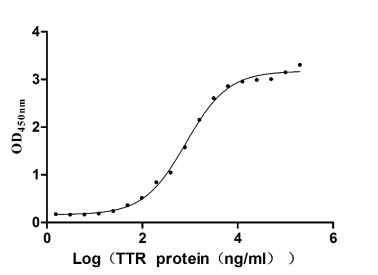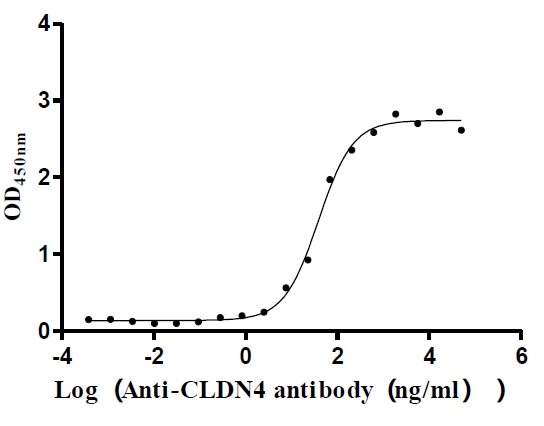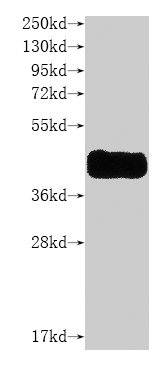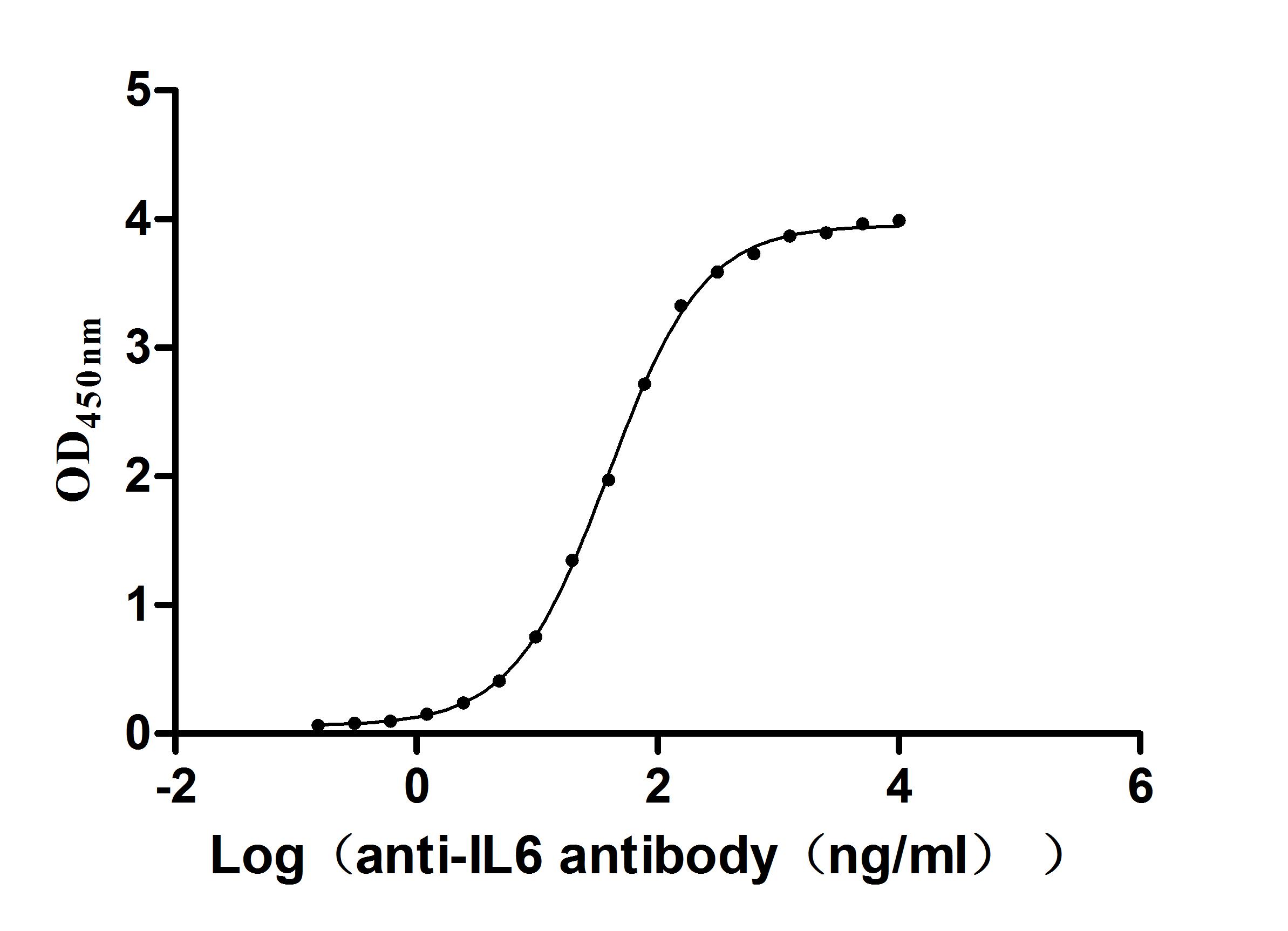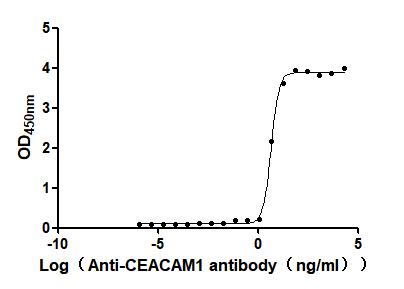Recombinant Human Vasoactive intestinal polypeptide receptor 2 (VIPR2), partial
-
货号:CSB-YP025860HU1
-
规格:
-
来源:Yeast
-
其他:
-
货号:CSB-EP025860HU1
-
规格:
-
来源:E.coli
-
其他:
-
货号:CSB-EP025860HU1-B
-
规格:
-
来源:E.coli
-
共轭:Avi-tag Biotinylated
E. coli biotin ligase (BirA) is highly specific in covalently attaching biotin to the 15 amino acid AviTag peptide. This recombinant protein was biotinylated in vivo by AviTag-BirA technology, which method is BriA catalyzes amide linkage between the biotin and the specific lysine of the AviTag.
-
其他:
-
货号:CSB-BP025860HU1
-
规格:
-
来源:Baculovirus
-
其他:
-
货号:CSB-MP025860HU1
-
规格:
-
来源:Mammalian cell
-
其他:
产品详情
-
纯度:>85% (SDS-PAGE)
-
基因名:
-
Uniprot No.:
-
别名:VIPR2; VIP2R; Vasoactive intestinal polypeptide receptor 2; VIP-R-2; Helodermin-preferring VIP receptor; Pituitary adenylate cyclase-activating polypeptide type III receptor; PACAP type III receptor; PACAP-R-3; PACAP-R3; VPAC2
-
种属:Homo sapiens (Human)
-
蛋白长度:Partial
-
蛋白标签:Tag type will be determined during the manufacturing process.
The tag type will be determined during production process. If you have specified tag type, please tell us and we will develop the specified tag preferentially. -
产品提供形式:Lyophilized powder
Note: We will preferentially ship the format that we have in stock, however, if you have any special requirement for the format, please remark your requirement when placing the order, we will prepare according to your demand. -
复溶:We recommend that this vial be briefly centrifuged prior to opening to bring the contents to the bottom. Please reconstitute protein in deionized sterile water to a concentration of 0.1-1.0 mg/mL.We recommend to add 5-50% of glycerol (final concentration) and aliquot for long-term storage at -20℃/-80℃. Our default final concentration of glycerol is 50%. Customers could use it as reference.
-
储存条件:Store at -20°C/-80°C upon receipt, aliquoting is necessary for mutiple use. Avoid repeated freeze-thaw cycles.
-
保质期:The shelf life is related to many factors, storage state, buffer ingredients, storage temperature and the stability of the protein itself.
Generally, the shelf life of liquid form is 6 months at -20°C/-80°C. The shelf life of lyophilized form is 12 months at -20°C/-80°C. -
货期:Delivery time may differ from different purchasing way or location, please kindly consult your local distributors for specific delivery time.Note: All of our proteins are default shipped with normal blue ice packs, if you request to ship with dry ice, please communicate with us in advance and extra fees will be charged.
-
注意事项:Repeated freezing and thawing is not recommended. Store working aliquots at 4°C for up to one week.
-
Datasheet :Please contact us to get it.
相关产品
靶点详情
-
功能:This is a receptor for VIP as well as PACAP-38 and -27, the activity of this receptor is mediated by G proteins which activate adenylyl cyclase. Can be coupled to phospholipase C.
-
基因功能参考文献:
- a novel gene duplication syndrome (10q21.2q21.3 microduplication) and new evidence for VIPR2 duplication, as a candidate gene for autism, are reported. PMID: 27796743
- Data suggest that VIPR2, which is a negative regulator of smooth muscle cell proliferation, might be a novel tumor suppressor gene in uterine leiomyosarcomas. PMID: 29063609
- The 'CC' genotype of the VIPR2 gene was nominally associated with an increased risk of SCZ in male Han Chinese patients. PMID: 27156032
- Lower CpG methylation of VIPR2 in the saliva of children with ADHD. PMID: 26304033
- CD4+ T cells in HIV infection show increased levels of expression of VPAC2 PMID: 24469917
- This study suggest that carriers of microduplication genotypes of VIPR2 are predisposed to SCZ in Han Chinese. PMID: 24794882
- Monocytes from Sjogren's syndrome patients display increased vasoactive intestinal peptide receptor 2 expression and impaired apoptotic cell phagocytosis. PMID: 24827637
- Data indicate that VIP and PACAP increased macrophage resistance to HIV-1 replication by inducing the synthesis of beta-chemokines CCL3 and CCL5 and IL-10 following preferential activation of the receptors VPAC2 and PAC1. PMID: 23818986
- This is the first study to suggest a role of VIPR2 in the genetic susceptibility to high myopia. EGR1, JUN, FOS and VIP are unlikely to be important in predisposing humans to high myopia. PMID: 23637909
- Genetic testing for VIPR2-LCR-associated inversions should be performed on available cohorts of psychiatric patients to evaluate their potential pathogenic role PMID: 23073313
- Conclude that VPAC2/PAC1 receptors require NO in series to effect cutaneous active vasodilation during heat stress in humans. PMID: 22961270
- PACAP causes PAC1/VPAC2 receptor mediated hypertension and sympathoexcitation in normal and hypertensive rats. PMID: 22886412
- gene expression level and cAMP signaling of VIPR2 were increased in patients carrying 7q36.3 microduplications, thus implicating VIPR2 in the etiology of schizophrenia.[review] PMID: 21721910
- VPAC(2) receptor presents an extranuclear localization and its protein expression is lower than that of VPAC(1) receptor in human breast tissue samples PMID: 20691743
- VPAC2 and/or PAC1 receptor activation is involved in cutaneous active vasodilation in humans. PMID: 20395540
- Detection of beta-galactosidase marker for human VPAC2/VIPR2 in cells withinin the suprachiasmatic nucleus (SCN) of transgenic mice indicates that VPAC2 may contribute to autoregulation and/or coupling within the SCN core and to control of the SCN shell. PMID: 15090046
- analysis of a mutant form of VPAC2 shows its role in signaling and ligand binding PMID: 15302876
- a novel recombinant agonist for VPAC2 is not active against PAC1 PMID: 16500728
- The abnormal expression of VPCAP2-R mRNA in gallbladder tissue may play a role in the formation of gallbladder stones and gallbladder polyps PMID: 16552823
- VPAC2-R mRNA was visualized only in the cerebellum of 7-22-year-old subjects. PMID: 16572459
- splice variants may modify the immunoregulatory contributions of the VIP-VPAC2 axis PMID: 16888203
- identification and characterization of novel five-transmembrane(5TM) isoforms of VPAC2 PMID: 16934434
- altered expression of VPAC2 in activated CD4+ T cells derived from multiple sclerosis (MS) patients rendered CD4+ T cells less responsive to VIP and skewed the system to a predominantly T(h)1 direction. PMID: 17077178
- Daily stimulation of VPAC2, but not VPAC1 or PAC1, resulted in up to 90% inhibition of X4 or R5 productive infections in either cell lines or PBMCs. PMID: 17257640
- a novel mechanism of calmodulin in regulating PACAP signaling by possible interaction with the inactive state of PAC1 and VPAC2 receptors. PMID: 19269029
显示更多
收起更多
-
亚细胞定位:Cell membrane; Multi-pass membrane protein.
-
蛋白家族:G-protein coupled receptor 2 family
-
组织特异性:Expressed in CD4+ T-cells, but not in CD8+ T-cells. Expressed in the T-cell lines Jurkat, Peer, MOLT-4, HSB, YT and SUP-T1, but not in the T-cell lines HARRIS and HuT 78.
-
数据库链接:
HGNC: 12695
OMIM: 601970
KEGG: hsa:7434
STRING: 9606.ENSP00000262178
UniGene: Hs.585052
Most popular with customers
-
Recombinant Human Retinol-binding protein 4 (RBP4) (Active)
Express system: Mammalian cell
Species: Homo sapiens (Human)
-
Recombinant Rat Intestinal-type alkaline phosphatase 1 (Alpi) (Active)
Express system: Mammalian cell
Species: Rattus norvegicus (Rat)
-
Recombinant Human Claudin-4 (CLDN4)-VLPs (Active)
Express system: Mammalian cell
Species: Homo sapiens (Human)
-
Recombinant Human C-C chemokine receptor type 8 (CCR8)-VLPs (Active)
Express system: Mammalian cell
Species: Homo sapiens (Human)
-
Recombinant Human Myosin regulatory light chain 12A (MYL12A) (Active)
Express system: E.coli
Species: Homo sapiens (Human)
-
Recombinant Macaca fascicularis Transmembrane 4 L6 family member 1 (TM4SF1)-VLPs (Active)
Express system: Mammalian cell
Species: Macaca fascicularis (Crab-eating macaque) (Cynomolgus monkey)
-
-
Express system: Mammalian cell
Species: Homo sapiens (Human)


